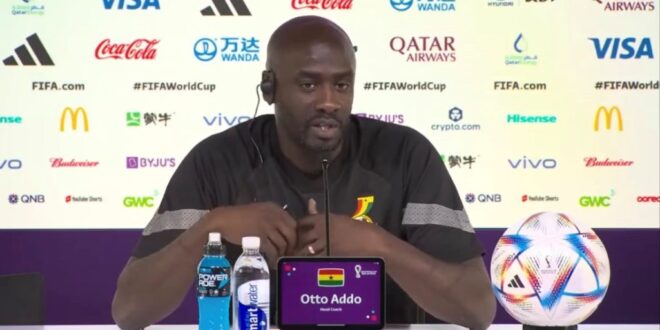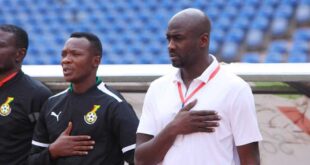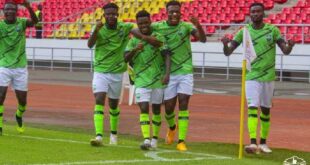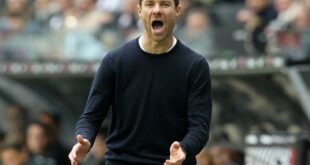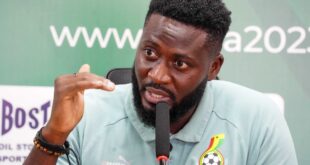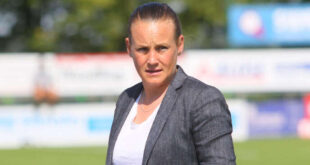It’s 2024, and Ghana’s football landscape is in dire straits. The blame game is in full swing, with accusations flying regarding coaching, the state of the local league, player commitment, and grassroots football among others.
Amidst the turmoil, the spotlight now turns to the potential return of Otto Addo as the head coach of the Black Stars.
@ghanafaofficial to pay @BVB to have Otto Addo?
I hope the figure in my ears are false. pic.twitter.com/yRYES2qFKq
— Muftawu Nabila Abdulai (@Muftawu_Nabila) March 1, 2024
Numerous coaches have struggled to propel the team forward, leading to a growing consensus that coaching might not be the sole root of the problem. Now, the focus shifts to the process of appointing coaches.
Chris Hughton, the last appointment, marked the fourth coach under the current Ghana Football Association, and speculation persists that he wasn’t their preferred choice. The possibility of government influence has been acknowledged, but questions arise about past appointments made solely by the football association.
Discussions around the coaching selection process and the need for a more transparent and effective approach have gained prominence. The hope is that addressing these issues can contribute to a positive transformation in Ghana’s football fortunes.
However, a more pressing concern emerges as the Ghana Football Association (GFA) steers through the process of selecting a new coach to replace Chris Hughton, with Otto Addo seemingly leading the race. The pivotal question arises: does Otto Addo genuinely merit a second stint with the Black Stars?
As unbelievable as it sounds, the Dortmund trainer scout is being considered for the role. The FA’s requirements include having a proven track record in coaching Top Men’s National Team or Club Football, a football philosophy aligning with the Ghana football DNA, holding the highest football license with over 15 years of experience, expertise in team reconstruction, organization, and development of young talent, as well as being a proven disciplinarian, tactician, and leader. Otto Addo, clearly, falls short of meeting most of these criteria.
Despite receiving over 500 applications, the FA seems willing to overlook these shortcomings and believes that he is the right man who can potentially restore Ghana’s football fortune. If this decision goes through, the rationale behind it would be challenging to comprehend.
Ghana’s history with second comings
The Black Stars have witnessed numerous instances of coaches returning for a second term. While some have delivered the desired results, others have fallen short. Hence, the current argument doesn’t revolve around the concept of second comings in general but rather scrutinises the specific choice of a coach for a return.
The potential second term for Otto Addo would not mark the first, and certainly not the last occurrence in the history of football. However, the decision to reappoint a coach for a second stint has traditionally hinged on two main factors: either an impressive record during their initial tenure or notable improvement demonstrated after leaving the position. Regrettably, Otto Addo’s case seems to lack a compelling fit within either of these criteria.
Despite the mixed outcomes observed in the second stints of Black Stars coaches it would be premature to categorise all return scenarios as inherently negative. Therefore, the emphasis remains on the necessity for any return to be justified and merited based on the coach’s performance and qualifications.
A notable example of a successful second coming in Ghana’s football history is that of the revered Charles Kumi (CK) Gyamfi. His return as coach proved instrumental in securing Ghana’s fourth and last Africa Cup of Nations (AFCON) trophy in 1982. CK Gyamfi retook the reins after 17 years, having previously led Ghana to consecutive continental triumphs.
His second term was particularly significant, as it not only added another AFCON title but also etched his name in the annals of African football history. He became the first to guide a nation to three AFCON championships – a feat only matched by Egypt’s Hassan Shehata. Crucially, CK Gyamfi earned his second chance through the resonance of past glories, with his impressive track record serving as a testament to his capabilities.
Fred Osam Duodu’s ability to secure three additional stints with the Black Stars after guiding Ghana to AFCON glory in 1978 can also be attributed to his impressive track record as well. The success he achieved with the team in the notable triumph saw his return at the helm.
Emanuel Kwasi (EK) Afranie, initially serving as an assistant coach during Osam Duodu’s triumphant 1978 campaign, showcased his coaching prowess, laying the groundwork for his subsequent appointments. Despite facing challenges when assuming the role of coach in 1984, Afranie later established himself as an exceptional talent scout and development coach. His remarkable work with young players, many of whom are still celebrated today, was exemplified by guiding the Ghana U-20 side, the Black Satellites to the final of the 2001 World Youth Championship.
Given his impressive track record and knack for nurturing talent, it was not surprising he got another bite of the cherry by leading the Black Stars in 2002.
Burkhard Ziese’s return marked the onset of a series of unfortunate comebacks for coaches to the national team. The overarching question revolves around what justified his second stint. Similarly, Milovan Rajevac and Kwesi Appiah made comebacks, each with their own narratives.
Despite a dismal performance at AFCON 2021, Milovan Rajevac’s appointment was somewhat justified by his earlier success in leading the Black Stars to the 2010 World Cup quarterfinals.
Kwesi Appiah, the first African to guide Ghana to the 2014 World Cup, faced controversies during his tenure, but his notable performance as a coach in his initial stint provided a foundation for his return.
These instances underscore how the performance of their previous stint often served as the job interview for a second appointment unless it was a temporary, quick fix.
What does Otto Addo offer?
Otto Addo’s coaching tenure during his first stint recorded a win rate of 33.3% in 12 games, with 14 goals scored and 16 conceded. Notably, the team failed to score in four games. In comparison, CK Akonnor had a 40% win rate, while Rajevac and Hughton recorded win rates of 37.5% and 30.77%, respectively.
Emphatically there was nothing really substantial to be excited about during Otto Addo’s first tenure as echoed by some former footballers.
While there was a success in the World Cup qualification playoff against Nigeria, the overall achievement lacks the substance to warrant excitement. Drawing two high-profile games isn’t too big an achievement except for the occasion and the rivalry existing between the two West African sides. Ghana were only favoured by the ‘unfair’ away goal rule.
What’s Otto Addo’s coaching philosophy?
Otto Addo’s coaching philosophy is a subject of scrutiny as well, particularly due to concerns raised about his approach. Despite his experience with Borussia Dortmund, his initial attempt to implement a proactive coaching style seemed to fall short. The defensive-oriented setup, coupled with an average possession rate of 48% in all 12 matches, indicates a more conservative approach reminiscent of strategies employed by previous Black Stars coaches.
In specific instances, such as the matches against Madagascar and the Central African Republic in the AFCON qualifiers, the only times possession rates exceeded 55% (69% and 71% respectively), alongside the game against Nicaragua, Otto Addo appeared to favour attacking-minded players. This departure from his usual style was necessitated by the unavailability of his preferred defensive players, who were sidelined due to injuries.
Given these figures, there should already be a collective sentiment against having a coach with a predominantly defensive approach.
The experience with Chris Hughton, who prioritised defensive tactics illustrating the adverse effects of starting on the back foot raises concerns about Otto Addo’s suitability for the team’s needs. The tendency to overlook skillful players, as seen in the limited playing time for Ernest Nuamah, Osman Bukari, and Ashimeru, coupled with consistently fielding two defensive midfielders, emphasises the need for a coach with a different and more balanced approach.
This pattern was evident in Otto Addo’s tenure, where Joseph Paintsil, despite his remarkable contributions at KRC Genk, found himself overlooked for the final 2022 World Cup squad.
The profile of the next coach is crucial. Otto Addo, based on his past tenure and coaching philosophy, does not fit the profile Ghana needs at this time.
 Radio1Ghana Serving Communities
Radio1Ghana Serving Communities


